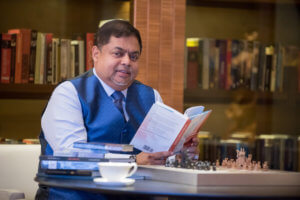#ThoughtLeadership
Entrepreneur and author Vijay Eswaran shares insights on how emptying one’s ‘cup’ can open the mind to change.

Vijay Eswaran
One of the first things a mentor told me when I began my journey in entrepreneurship was that I needed to “empty my cup.” To help me understand he told me the story of Master Suzuki, a wise old man who was a master of the art of Zen. People came to him from all over the world in search of counsel and guidance. To be a student of Master Suzuki was considered an honour and privilege since his training programmes were tough and students took years to get through each level of training.
One fine morning, a student showed up at his doorstep wanting to learn from him.
“I have spent the last seven years studying the mystical arts of the Orient: tai chi, wushu, shaolin, taekwondo and hapkido. I am now ready to master the art of Zen,” he proudly stated.
Master Suzuki told him he could not accept him as a student. The young aspirant was taken aback and couldn’t understand why he was being turned away. He tried to explain that he was a quick learner, that he already had a great foundation due to his earlier training, and that he was more than qualified to learn the art of Zen.
Finally, Master Suzuki invited him in for a cup of tea. He placed two empty cups between them and asked the young aspirant to pour him a cup of tea. The young man picked up the teapot and started pouring. As the tea began to rise to the brim, he stopped. But Master Suzuki said, “I didn’t ask you to stop. Please continue pouring.”
Puzzled, the young man continued to pour even as the tea spilled over and began to spread on the table and overflow to the tatami mat below. The master pointed to the now overflowing tea cup and said, “This is you. And that teapot is filled with the knowledge awaiting you. But you are so full of your own opinions and speculations that nothing more can be added. How can I teach you anything else unless you first empty your cup?”
I have since heard many different variations of this story. Each time, the lessons remain unchanged, though my own understanding of the lessons has evolved over time.
In this story, the tea represents knowledge. That which already exists in the cup is our ego. The fuller our cup the bigger our ego. If you have a full cup, it means you feel that you already know everything and that prevents you from learning anything new. To empty the cup is to empty yourself of the ego. To learn is to open your eyes to the wonders of the world and everything it has to offer. The more you learn, the more you know. But one fact remains — you can never know it all.
Over the years, I have realised that emptying the cup is not about forgetting what you already know. Neither is it about metaphorically emptying your thought process. The truth is, it is about suppressing the ego. The ego does not dissipate so easily. As any aspirant on any kind of spiritual path will tell you, suppressing the ego is fundamental to spiritual growth.
More so (and this realisation came to me much later in life), the suppression of the ego is important in any learning process because the ego fundamentally resents change. It will not allow the ingestion of new knowledge, for its purpose is always to retain the status quo. Our true battle has always been and will probably always be with the ego.
This parable is also an attempt to highlight how the ego impacts our social interactions — including those that occur while networking at events and attending meetings. Even when we attend an educational seminar or seek advice from an industry expert, our self-perceptions and desires cannot help but show up. How often do we tune out the words of others, listening not with the intent to understand but thinking instead of how we are going to respond or what we are going to say next?
The ego will not allow its supremacy to be challenged and will use any platform to resist change.
Sadly, we end up confusing our identity with our ego. We end up thinking that by defending the ego and its position, we are defending ourselves. Nothing could be further from the truth. The ego, strangely enough, makes itself appear as your closest friend and benefactor when in reality, it is the reverse.
The ego is your ultimate enemy. Perhaps it is your only enemy. If you cannot suppress the ego, there is no learning, no growth, and no understanding. And above all, you begin to believe that there is no higher power than yourself.
The process of emptying your cup is not a one-time act. It is a continuous process, and one we need to practice on a daily basis. I practice an hour of silent introspection each day as my way of emptying my cup. During my hour of silence, I see my ego for what it is and my conscience steps forward in all of its clarity.
The ego has full access to your intellect, which means it knows all of your weaknesses. There is nothing you can hide from it. Its greatest opponent and sparring partner is your conscience. To defeat the ego, your conscience needs to be louder, clearer, and bolder. An emboldened conscience is your best defence.
Emptying the cup is not just important, it’s critical to preserving your sanity, your clarity, and your ability to grow. Empty your cup before your life is emptied of its purpose.
Vijay Eswaran is an entrepreneur, motivational speaker, and philanthropist, and the author of the best-selling book In the Sphere of Silence. This article is adapted from Eswaran’s new book Two Minutes From the Abyss.

